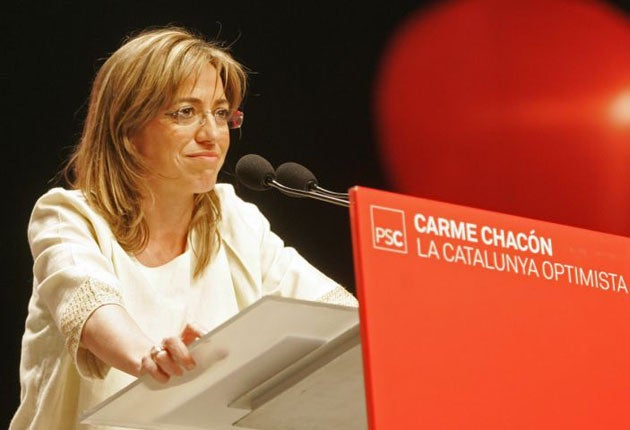Spain's defence minister shot down over Nato gaffe
Controversial politician in trouble over announcement to pull troops out of Kosovo

Your support helps us to tell the story
From reproductive rights to climate change to Big Tech, The Independent is on the ground when the story is developing. Whether it's investigating the financials of Elon Musk's pro-Trump PAC or producing our latest documentary, 'The A Word', which shines a light on the American women fighting for reproductive rights, we know how important it is to parse out the facts from the messaging.
At such a critical moment in US history, we need reporters on the ground. Your donation allows us to keep sending journalists to speak to both sides of the story.
The Independent is trusted by Americans across the entire political spectrum. And unlike many other quality news outlets, we choose not to lock Americans out of our reporting and analysis with paywalls. We believe quality journalism should be available to everyone, paid for by those who can afford it.
Your support makes all the difference.The Spanish Defence minister, Carme Chacón, suffered a dramatic fall from grace after announcing that Spain would shortly withdraw from Nato operations in Kosovo, only to have the decision reversed yesterday following a diplomatic row.
On a morale-boosting trip to troops in Kosovo last week, Ms Chacón, Spain's first female defence chief and a star of Jose Luis Rodriguez Zapatero's majority female cabinet, declared: "The mission has been completed and it's time to return home."
But her announcement burst like a bombshell among Nato officials, the US administration and senior diplomats who complained she had acted unilaterally and failed to inform them through the proper channels.
Madrid swiftly back-pedalled yesterday, saying the timetable for withdrawal was flexible. "Carme Chacón will meet Nato's secretary-general next week to explain the reasons for the withdrawal and to reach a joint decision on a timetable," Mr Zapatero's spokesman said. "The decision to leave has been made but we can be flexible over the timetable, be it one year, 18 months or eight months."
The diplomatic gaffe is a reverse of fortune for Ms Chacón, 38, who made headlines when she took office last April and reviewed her troops while heavily pregnant. During a visit to Spanish soldiers in Afghanistan, images of this slight figure with her bump, her smock fluttering in the desert breeze, signalled a new mood of equality in Spain. She promptly purged the top brass, reformed and humanised Spain's discredited armed forces which became, within months, one of the country's most valued institutions.
But her brusque inexperience ruffled feathers, and her latest faux pas has revived criticisms from those who questioned whether a woman could run defence matters. The anti-government El Mundo newspaper condemned Ms Chacó*yesterday for "incompetence" and Mr Zapatero for "frivolity" in appointing her. The paper accused her of putting image before substance, calling photo opportunities without allowing questions, and of wearing a trouser suit to a military gala.
Even the usually sympathetic El Pais found her action "incomprehensible ... deepening the vision of Spain as an unpredictable international ally who responds only to the stimuli of domestic policy".
The timing could not have been worse. Spain has been carefully preparing for next month's G20 summit in London and Nato summit in Strasbourg as occasions for Mr Zapatero to establish friendly ties with President Barack Obama, after the froideur of the Bush years, and to boost flagging popularity at home.
Spain has about 600 troops in Kosovo as part of a UN mission that includes some 15,500 soldiers from Nato members and allies. Ms Chacó*telephoned Nato's secretary-general, Jaap de Hoop Scheffer, to alert him that she would announce the troop withdrawal, but she was unable to contact her US opposite number, Robert Gates, and told a senior defence official to pass on the message.
When the US learned of her decision, it sought clarification from Spain's ambassador in Washington, Jorge Dezcallar, who reportedly admitted he had not been told either. Ms Chacón's action prompted a dressing down from a US state department spokesman who said he was "deeply disappointed in Spain" – an expression he repeated a blistering four times in a single press conference.
Mr Zapatero dispatched his senior foreign policy advisor, Bernadino Leon, to Washington to extinguish the diplomatic flames.
On her return, Ms Chacó*called Mr Scheffer again, apparently bewildered by the avalanche of criticism engulfing her. Caught on the hop and isolated in the cabinet, she has stayed silent since.
Join our commenting forum
Join thought-provoking conversations, follow other Independent readers and see their replies
Comments